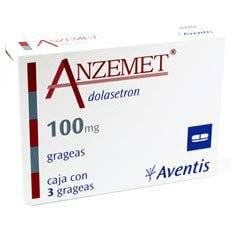This is an automatically translated article.
Zuplenz is a medicine used to treat nausea and vomiting caused by cancer or surgery. Follow the article below to know what is Zuplenz drug?1. What is Zuplenz?
Zuplenz medicine has the main ingredient Ondansetron, prepared in the form of a coated tablet that dissolves in the mouth.
Ondansetron may be used alone or in combination with other medicines to prevent nausea and vomiting caused by cancer treatment or during surgery.
Ondansetron fights vomiting by blocking 1 of the body's natural substances, such as serotonin, that can cause a vomiting reaction.
2. Indications and contraindications of the drug Zuplenz
Indications:
Zuplenz is used to prevent nausea and vomiting caused by surgery, cancer chemotherapy or radiation therapy. Contraindications:
You should not use Zuplenz if:
You are using apomorphine (Apokyn); Have a severe allergic reaction to ondansetron or similar medicines (dolasetron, granisetron, and palonosetron). Children under 4 years old.
3. How to use and dose Zuplenz
Dosage:
Zuplenz is formulated to dissolve on your tongue. Do not chew, but allow the film-coated tablet to dissolve in your mouth. Use Zuplenz correctly by following these steps:
Use dry hands to open the protective foil pouch just before using the medicine. Then remove a layer of film and place Zuplenz on top of your tongue. Let Zuplenz dissolve completely (usually for 4 to 20 seconds), then swallow it directly or with liquid. If the dose is more than that, let each film dissolve completely before taking the next. Wash your hands immediately after using this medicine. When to take it:
To prevent nausea caused by chemotherapy, take Zuplenz as directed by your doctor, usually 30 minutes before starting treatment. To prevent nausea caused by radiation therapy, take Zuplenz 1 to 2 hours before starting treatment. To prevent nausea after surgery, take Zuplenz 1 hour before the procedure begins. The dose of Zuplenz that can be used depends on your medical condition. Ondansetron can be taken up to 3 times a day for 1 to 2 days after each course of chemotherapy or radiation therapy. To help remember to take Zuplenz, take it at the same times each day.
4. Side effects of the drug Zuplenz
Common Zuplenz side effects may include: Diarrhea, constipation, headache, drowsiness, or feeling tired. Get emergency medical help if you have signs of an allergic reaction to Zuplenz such as: rash, hives, fever, chills, trouble breathing; swelling in the face, swelling of the lips, tongue, or throat. Stop Zuplenz and call your doctor at once if you have: Severe constipation, stomach pain, bloating, headache, chest pain, severe dizziness, fainting, fast or pounding heartbeat, heartbeat rapid or pounding heartbeats, yellowing of the skin or eyes, blurred vision or temporary loss of vision but usually lasts only a few minutes to a few hours, high levels of serotonin in the body cause agitation, hallucinations, and hallucinations. , febrile reaction, tachycardia, overactive reflexes, nausea or vomiting, diarrhea, and loss of coordination. Other side effects may also occur when you take Zuplenz. If these side effects are severe or persistent, you should talk to your doctor right away for advice.
5. Things to keep in mind when taking Zuplenz
Before taking Zuplenz, tell your doctor if you are allergic to it or any other allergies. Before using Zuplenz, also tell your doctor or pharmacist your medical history, especially of: Irregular heartbeat, liver, stomach and intestinal problems (such as abdominal surgery). more recently, ileum). When taken, Zuplenz can cause a condition that affects the heart rate (QT prolongation), which leads to a serious irregular heartbeat (rarely fatal), other symptoms that may be severe such as dizziness. severe, fainting, and may need immediate medical attention. Your risk of experiencing QT prolongation may be increased if you have certain medical conditions or are taking other medicines that can prolong QT. Low levels of potassium or low magnesium in the blood can also increase the risk of QT prolongation. This risk may be increased if you use diuretics or experience excessive sweating, diarrhea, and vomiting. You need to ensure that you have enough electrolytes when taking the drug to avoid a decrease in potassium or magnesium in the blood. Zuplenz may cause dizziness or drowsiness. Using alcohol or marijuana may make you more dizzy or drowsy. Do not drive, use machinery, or do anything that requires alertness until you can do it safely. Avoid using alcoholic beverages. Talk to your doctor if you are using marijuana or drinking alcohol regularly. During pregnancy, Zuplenz should not be used, it should only be used when absolutely necessary. It can harm an unborn baby when used by pregnant women. There is not enough data to prove whether Zuplenz passes into breast milk. Therefore, you should consult your doctor before taking Zuplenz to someone who is breast-feeding. Possible drug interactions when combined with Zuplenz include: Antibiotics, antidepressants, medicines for arrhythmias, antipsychotics, drugs for cancer, malaria, HIV or AIDS. . To be on the safe side, tell your doctor about all products you are using, start or stop using during your treatment with Zuplenz. Store Zuplenz in an airtight container and at room temperature when not in use. Keep medicine out of reach of children. Hopefully, the above information about Zuplenz will help to use this product safely and effectively. You need to make sure to take the medicine as prescribed to minimize the risk of side effects and if there are any abnormalities, notify your doctor immediately.
Please dial HOTLINE for more information or register for an appointment HERE. Download MyVinmec app to make appointments faster and to manage your bookings easily.













